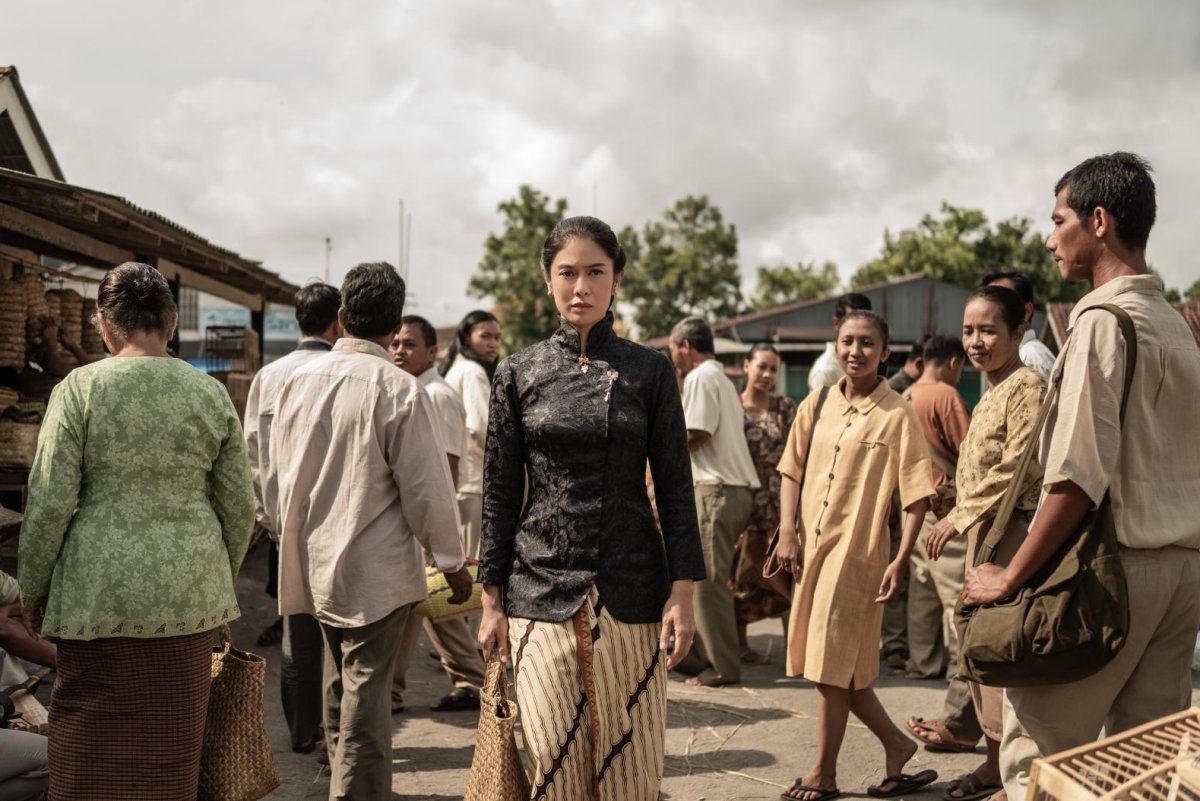

Dian Sastrowardoyo plays Dasiyah in the Indonesian period drama “Cigarette Girl,” which premieres on Netflix Thursday. Photo courtesy of Netflix
Dasiyah and Soeraja (Ario Bayu) find forbidden romance against the backdrop of the 1960s tobacco industry in Indonesia in “Cigarette Girl.” Photo courtesy of Netflix
Lebas (Arya Saloka) and Arum (Putri Marino) try to piece together a decades-old family mystery in “Cigarette Girl.” Photo courtesy of Netflix
“Cigarette Girl” is set against a period of sweeping social and political upheaval in Indonesia. Photo courtesy of Netflix
Nov. 2 (UPI) — When we first meet elderly tobacco tycoon Soeraja (Ario Bayu), he is in a hospital bed and seems to be taking a turn for the worse. As monitors beep, he springs up in bed, pulling the breathing tube from his nose and frantically searching for something — or someone.
“Jeng Yah,” he frantically tells his son Lebas (Arya Saloka), a feckless Jakarta playboy who has been taking a turn staying by dad’s bedside.
Advertising
“I’m looking for Jeng Yah — before it’s too late, find her,” he pleads, before passing out again.
This Rosebud-esque prompt sets the stage for Cigarette Girl, a sweeping, smoke-filled five-episode series that premiered at last month’s Busan International Film Festival and began streaming on Netflix Thursday.
The series moves between two time periods: the 1960s, where we encounter lush tobacco estates and start to learn the origin story of Soeraja’s family fortune; and 2001, where Lebas tries to track down the identity of the mysterious Jeng Yah.
In the older sequences, we are introduced to the character of Dasiyah, played by Indonesian superstar Dian Sastrowardoyo. A solemn-faced beauty who is the eldest daughter of a local cigarette magnate, she harbors a secret passion for kretek, the clove cigarettes that were once a major industry in Indonesia.
In fact, she has a prodigal talent for tobacco, with an incredible nose, sensitive palate and a knack for sneaking into the lab — off-limits to women — to find just the right blend of ingredients. However, according to the rigid social structures of the time, she appears destined for nothing more than a luxurious, and limited, life as a wealthy wife in an arranged marriage.
“Nobody would want you if your hands reek of tobacco,” a condescending business associate chuckles as she sifts through different brands of cigarettes at the local market one day. But the fire in her eyes lets us know she’s not giving up her dreams quite so easily.
Cigarette Girl, directed by husband-and-wife duo Kamila Andini and Ifa Isfansyah, is based on a novel of the same name by Ratih Kumala.
Isfansyah had originally wanted to turn the book into a film, but then brought the idea of adapting the wide-ranging saga as a series to his wife Andini, the filmmakers explained at a premiere of the first two episodes in Busan in October.
Andini said she was immediately drawn to the character of Dasiyah and the notion of such a gifted woman being limited by her society.
“The first thing I wanted to highlight is this character of a woman with a very rare talent,” Andini said. “I didn’t know that this profession existed. But in many industries there are talents, and to see a woman having these kinds of abilities, to be able to taste and to smell and [to be] so sensitive about it — it’s amazing and I wanted the audience to go into her world.”
As Dasiyah struggles to find a way forward, a dashing figure in the form of Soeraja (Ario Bayu) — the younger version of the elderly patriarch — appears. He arrives as a down-on-his-luck laborer from out of town, but is given a job hand-rolling cigarettes on the household production line by Dasiyah’s father and quickly moves up the ranks of the family business. An Upstairs, Downstairs forbidden romance begins to catch flame, and Soeraja helps Dasiyah to secretly continue working on her kretek blends.
Meanwhile, back in the 2001 period, Lebas meets Arum (Putri Marino), also from an old tobacco dynasty, and together they dig through family archives as they start to unravel the secrets of the past. Ominous questions swirl in the air: how exactly did Soeraja end up atop a cigarette empire? And what became of the brilliant, talented Dasiyah? Is she Jeng Yah after all?
Cigarette Girl at times plays out in a conventional manner, hitting the typical beats of an old-fashioned romantic melodrama — the locking of eyes across a room, the accidental brushing of hands. But over the first two episodes, intriguing layers continue to unfold, with the intricately crafted, smoky-hued period piece playing out against a backdrop of major political and social upheaval.
The series also offers a fascinating deep dive into a setting rarely seen on streaming services as Indonesia, the world’s fourth-largest country, with a population of over 270 million, is starting to emerge as a filmmaking powerhouse.
This year’s Busan International Film Festival held a special showcase of seven features and five short films from Indonesia, and Cigarette Girl was the only non-Korean language streaming series to compete in the fest’s On Screen section.
Cigarette Girl’s creators said they hope global viewers will find a taste for the Netflix series’ blend of mystery, romance, history and social commentary.
“It’s not just about romance — there is also an industry conflict, there is a political situation, there is women’s empowerment,” Andini said. “We want the audience to really feel the emotions … but when you see the whole series, to also reflect on the [range of] events that are happening.”
